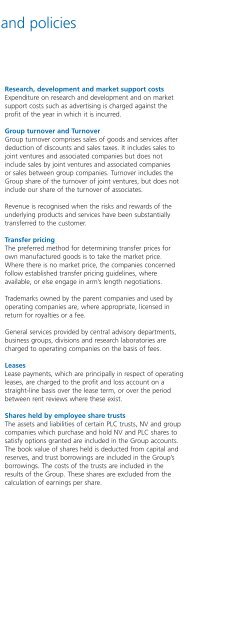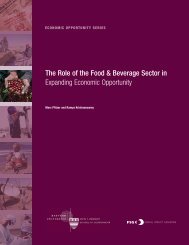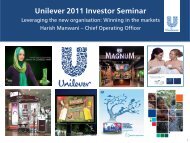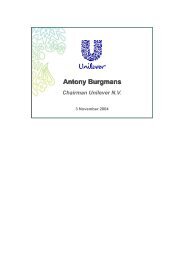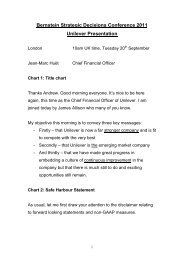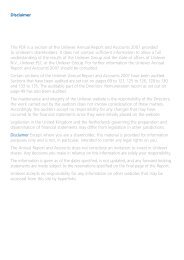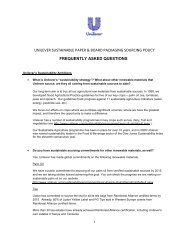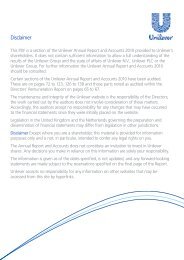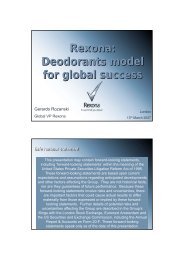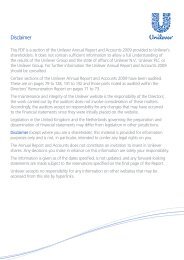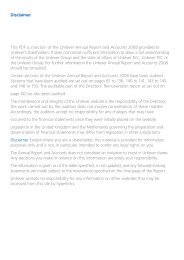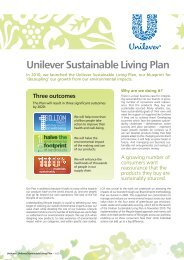Report & accounts 2002 in full - Unilever
Report & accounts 2002 in full - Unilever
Report & accounts 2002 in full - Unilever
Create successful ePaper yourself
Turn your PDF publications into a flip-book with our unique Google optimized e-Paper software.
138 Control of <strong>Unilever</strong><br />
Share capital<br />
NV’s issued share capital on 31 December <strong>2002</strong> was made<br />
up of:<br />
• €291 503 709 split <strong>in</strong>to 571 575 900 ord<strong>in</strong>ary shares<br />
of €0.51 each<br />
• €1 089 072 split <strong>in</strong>to 2 400 ord<strong>in</strong>ary shares numbered<br />
1 to 2 400, known as special shares<br />
• €130 854 115 split <strong>in</strong>to several classes of cumulative<br />
preference shares.<br />
PLC’s issued share capital on 31 December <strong>2002</strong> was made<br />
up of:<br />
• £40 760 420 split <strong>in</strong>to 2 911 458 580 ord<strong>in</strong>ary shares<br />
of 1.4p each<br />
• £100 000 of deferred stock.<br />
For NV share capital, the euro amounts quoted <strong>in</strong> this<br />
document are representations <strong>in</strong> euros on the basis of<br />
Article 67c of Book 2 of the Civil Code <strong>in</strong> the Netherlands,<br />
rounded to two decimal places, of underly<strong>in</strong>g amounts <strong>in</strong><br />
Dutch guilders, which have not been converted <strong>in</strong>to euros<br />
<strong>in</strong> NV’s Articles of Association or <strong>in</strong> the Equalisation<br />
Agreement. Until conversion formally takes place by<br />
amendment of the Articles of Association, the entitlements<br />
to dividends and vot<strong>in</strong>g rights are based on the underly<strong>in</strong>g<br />
Dutch guilder amounts.<br />
Unity of management<br />
In order to ensure unity of management, NV and PLC have<br />
the same directors. We achieve this through our nom<strong>in</strong>ation<br />
procedure. Only the holders of NV’s special shares can<br />
nom<strong>in</strong>ate candidates for election to the NV Board, and only<br />
the holders of PLC’s deferred stock can nom<strong>in</strong>ate candidates<br />
for election to the PLC Board. The current directors, who<br />
have agreed to act on the recommendations of the<br />
Nom<strong>in</strong>ation Committee, can ensure that both NV and PLC<br />
shareholders are presented with the same candidates for<br />
election as directors, because the jo<strong>in</strong>t holders of both the<br />
special shares and the deferred stock are NV Elma and<br />
United Hold<strong>in</strong>gs Limited, which are subsidiaries of NV<br />
and PLC.<br />
NV and PLC both act as directors of NV Elma and of<br />
United Hold<strong>in</strong>gs Limited. The Chairmen of NV and PLC<br />
are additional directors of United Hold<strong>in</strong>gs Limited.<br />
Equalisation Agreement<br />
To ensure that NV and PLC operate for all practical purposes<br />
as a s<strong>in</strong>gle company, we have an Equalisation Agreement.<br />
Under the Equalisation Agreement NV and PLC adopt the<br />
same f<strong>in</strong>ancial periods and account<strong>in</strong>g policies. Neither<br />
company can issue or reduce capital without the consent<br />
of the other. If one company had losses, or was unable to<br />
pay its preference dividends, we would make up the loss or<br />
shortfall out of:<br />
• the current profits of the other company (after it has paid<br />
its own preference shareholders)<br />
<strong>Unilever</strong> Annual <strong>Report</strong> & Accounts and Form 20-F <strong>2002</strong><br />
•then its own free reserves<br />
•then the free reserves of the other company.<br />
If either company could not pay its ord<strong>in</strong>ary dividends, we<br />
would follow the same procedure, except that the current<br />
profits of the other company would only be used after it<br />
had paid its own ord<strong>in</strong>ary shareholders and if the directors<br />
thought it appropriate.<br />
So far NV and PLC have always been able to pay their own<br />
dividends, so we have never had to follow this procedure.<br />
If we did, the payment from one company to the other<br />
would be subject to any United K<strong>in</strong>gdom and Netherlands<br />
tax and exchange control laws applicable at that time.<br />
The Equalisation Agreement also makes the position of the<br />
shareholders of both companies, as far as possible, the same<br />
as if they held shares <strong>in</strong> a s<strong>in</strong>gle company. To make this<br />
possible we compare the ord<strong>in</strong>ary share capital of the two<br />
companies <strong>in</strong> units: a unit made up of €5.445 nom<strong>in</strong>al of<br />
NV’s ord<strong>in</strong>ary capital carries the same weight as a unit made<br />
up of £1 nom<strong>in</strong>al of PLC’s ord<strong>in</strong>ary capital. For every unit<br />
(€5.445) you have of NV you have the same rights and<br />
benefits as the owner of a unit (£1) of PLC. NV’s ord<strong>in</strong>ary<br />
shares currently each have a nom<strong>in</strong>al value of €0.51,<br />
and PLC’s share capital is divided <strong>in</strong>to ord<strong>in</strong>ary shares of<br />
1.4p each. This means that a €5.445 unit of NV is made<br />
up of 10.7 NV ord<strong>in</strong>ary shares of €0.51 each and a £1 unit<br />
of PLC is made up of 71.4 PLC ord<strong>in</strong>ary shares of 1.4p each.<br />
Consequently, one NV ord<strong>in</strong>ary share equates to<br />
6.67 ord<strong>in</strong>ary shares of PLC.<br />
When we pay ord<strong>in</strong>ary dividends we use this formula.<br />
On the same day NV and PLC allocate funds for the dividend<br />
from their parts of our current profits and free reserves.<br />
We pay the same amount on each NV share as on 6.67 PLC<br />
shares calculated at the relevant exchange rate. For <strong>in</strong>terim<br />
dividends this exchange rate is the average rate for the<br />
quarter before we declare the dividend. For f<strong>in</strong>al dividends<br />
it is the average rate for the year. In arriv<strong>in</strong>g at the equalised<br />
amount we <strong>in</strong>clude any tax payable by the company <strong>in</strong><br />
respect of the dividend, but calculate it before any tax<br />
deductible by the company from the dividend.<br />
In pr<strong>in</strong>ciple, issues of bonus shares and rights offer<strong>in</strong>gs<br />
can only be made <strong>in</strong> ord<strong>in</strong>ary shares. Aga<strong>in</strong> we would<br />
ensure that shareholders of NV and PLC received shares<br />
<strong>in</strong> equal proportions, us<strong>in</strong>g the ratio of €5.445 NV nom<strong>in</strong>al<br />
share capital to £1 PLC nom<strong>in</strong>al share capital. The<br />
subscription price for one new NV share would have to be<br />
the same, at the prevail<strong>in</strong>g exchange rate, as the price for<br />
6.67 new PLC shares.<br />
Under the Equalisation Agreement (as amended <strong>in</strong> 1981)<br />
the two companies are permitted to pay different dividends<br />
<strong>in</strong> the follow<strong>in</strong>g exceptional circumstances:<br />
• if the average annual sterl<strong>in</strong>g/euro exchange rate changed<br />
so substantially from one year to the next that to pay<br />
equal dividends at the current exchange rates, either<br />
NV or PLC would have to pay a dividend that was<br />
unreasonable (ie, substantially larger or smaller <strong>in</strong> its own<br />
currency than the dividend it paid <strong>in</strong> the previous year).


